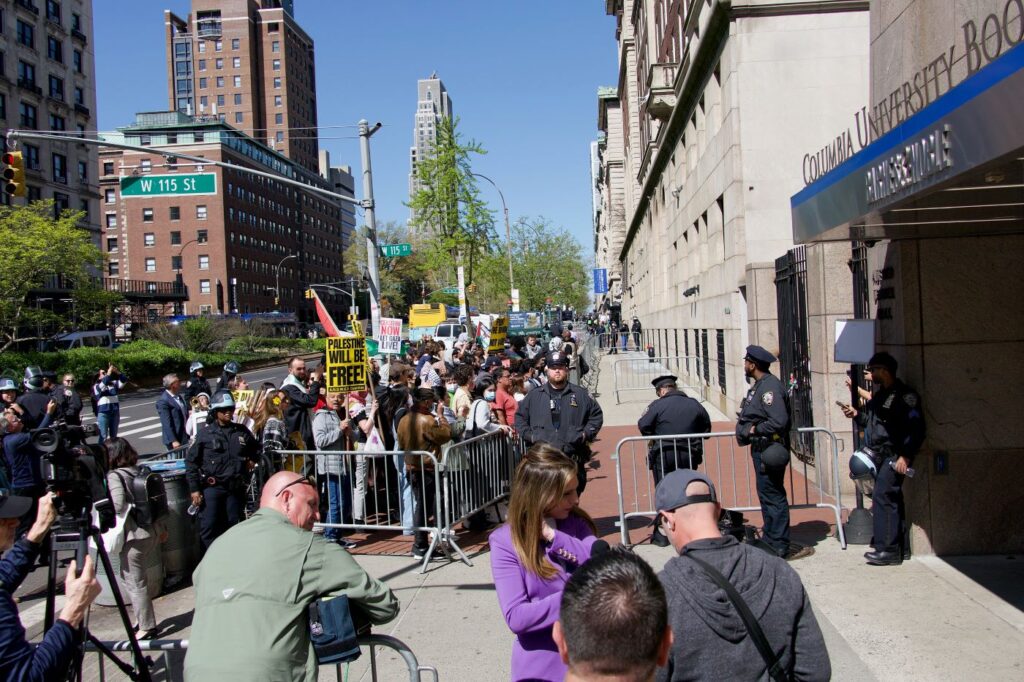I’ve observed the campus anti-Israel encampments both through news reports and firsthand at Princeton. Like much student activism, the “liberated zones” have aspects of the pathetic and the ridiculous. Pathetic as in protesting without knowing the first thing about Israel or Gaza; pathetic as in not knowing between which river and which sea “Palestine will be free”; pathetic as in waving the Hezbollah flag and then (according to anecdotal reports) claiming not to know that the flag belongs to a terrorist organization. (Maybe the fist and machine gun give a hint?) As for ridiculous, consider the use of Passover liturgies as political props, vocal praise of North Korea, and students pretending they are suffering in the same manner and extent as residents of Gaza, including requesting “basic humanitarian aid” for themselves.
The young are young, after all. Still, an obvious question remains: why Gaza? Where are the encampments for Kyiv? Where is the Popular University for Syria? The Uyghurs live unmolested and free? Our universities have no financial ties to the Chinese government worth protesting? No doubt, many civilians are suffering in Gaza, yet the flood of outrage directed toward the world’s only Jewish state is completely unaccompanied by any similar attention directed toward genocides and grave injustices taking place throughout the world. Why Israel?
I suspect a good number of students are responding to images from Gaza—TikTok pulls the heartstrings. A well-intentioned person might lack deep historical knowledge or long-standing commitment to a cause and be moved by sympathy for another. A very human response; in some ways an understandable, even praiseworthy impulse. Indifference to suffering is callousness, after all. Still, feeling sympathy is one thing; having a well-formed judgment is quite another. Responsible action requires intelligent—not merely subrational—motivation. Love, if true, is always intelligent.
In addition to those of tender hearts, those who want to join a lawn party before exams, and those protesting for protest’s sake, the agitators include true believers, some with long-standing commitments. Many of these are fully dedicated to their cause and are aware of, and embrace, its implications. Some yearn for a Palestinian state. Others take Israel to be an oppressive occupier. Others are flat-out anti-Semitic.
Start your day with Public Discourse
Sign up and get our daily essays sent straight to your inbox.Hate the West, Hate Israel
More is going on than is represented by those groups of students, however. Do not underestimate the nihilism of the protests.
In fact, Israel would be despised even in the absence of historical grievances, “apartheid,” or the Nakba, because Israel is a symbol and outpost of Western civilization. Whatever else Israel is—and it is many things to many people—it is also, as Daniel Johnson has argued, “central to the fate of the West, both as the frontier of its fights and as a symbol” of the West itself. Many (if not most) anti-Israel agitators are really moved not by whatever befalls Gaza, but by their own hatred of the West. Israel functions as a placeholder target for loathing—often self-loathing—directed at Western culture and the Hebraic sources at its origin. There is no Western civilization without Israel, and ancient Israel rejected the false gods that reassert themselves now.
In his commentary on Genesis, Leon Kass suggests the biblical text
presents the emergence of nascent Israel, bearer of God’s new way, in the context of three major cultural alternatives, the Babylonians, the Canaanites, and the Egyptians, each characterized by different ruling ideas. . . . Much can be learned about the distinctive character of the Judeo-Christian way—then and now—by thinking through the meaning of these quasi-polar alternatives. For though these ancient civilizations are long gone, their animating principles survive.
While the ancient civilizations of Genesis are long buried under sand—Israel excepted—they “represent a permanent human possibility,” while the biblical text, and the Judeo-Christian culture it supports, doggedly reject their contemporary versions.
These ancient alternatives to Israel represent—embody—the gods of pride, power, and license, along with the dehumanizing effects of those dis-values. At the tower of Babel, Kass notes, humans are “ignorant of their true standing in the world and their absolute dependence on powers not of their making and beyond their control”; they “forget and deny their own mortality.” The Nile, likewise, permitted a civilization “characterized by agricultural plenty, high levels of science and technology, advanced bureaucracy and public administration, and . . . a passion for longevity.” The Egyptians’ “preoccupation with survival and material well-being” led to the “enslavement” of themselves and others. Canaan represents shocking immorality, indicated by God’s instructing the Israelites to avoid “the doings of the land of Canaan” through multiple commandments forbidding sexual misbehavior and the practice of child sacrifice (Leviticus 18). Against pride, power, and license, biblical civilization reveals a path to wisdom in reverence, or fear of the Lord. The peoples of the book and the resulting Judeo-Christian way know that humans flourish when they reverence God’s instructions.
While Genesis does not use a philosophical idiom, its wisdom transposes into the metaphysical mode, and the tensions, frustrations, and resistance of transposition help form the eccentric pathways of Western civilization. Jerusalem, Athens, and Rome do not tell identical stories, but weave a Judeo-Christian tapestry united in its rejection of false gods in favor of awe, reverence, responsible freedom, ordered liberty, and concern for the flourishing and dignity of every human person. In our own moment, however, the ways of pride, power, and license are alive and well, attempting to reshape the West and negate the ancient Hebraic sources and their reminder to resist false promises and dehumanizing forms of life.
The protests are not simply about Gaza, but concern incompatible ways of life and value. They are another moment in the long rejection of Western metaphysics, anthropology, ethics, and epistemology by Westerners coming of age in a culture that teaches them to despise their own civilization. The protesters target the contemporary nation-state of Israel and a vital source and inheritor of our civilization. Old gods versus the tradition. The encampments at Columbia, Brown, and Princeton are minor skirmish points, not very important in themselves, and, despite appearances, not really about free speech or divestment; they are moments in an ongoing contest about the meaning and purpose of the human being. Israel, ancient and modern, makes a claim about the human being’s place in the universe that is fundamentally at odds with the commitments of those who despise our culture and its history.
A Crisis of Trust
In his 1969 essay about the student protests of that moment, Augusto Del Noce suggested they revealed a “crisis of trust in permanent values” and a “negation” of the past in light of the “school of suspicion.” This anti-culture rejected “contemplative thought, religion, and metaphysics” and reduced all “ideas to instruments of production.” Only instrumental reason, technocratic reason, remained. Despite the Marxist sources of those student protests, rejecting metaphysics and religion resulted in a decomposed Marxism. Suspicion vitiated and negated the messianic vision of justice (such as it was) of Marx; what remained, and all that remained, was a view of reason as a tool of power to produce desired outcomes without the competence to evaluate the worth of those outcomes. This rejection of teleological purpose evacuated Marxist goals and produced an insistence on affluence, comfort, and liberation. Or, to put it bluntly, the protests of the 1960s were the epitome of bourgeois society, wanting nothing more than technology, comfort, and license without consequence; that is, the same claims as Babel, Pharaonic Egypt, and Canaan.
Is it unfair to note that today’s protesters and university presidents seem equally bourgeois and nihilistic? The administrations are disarmed and feckless in the face of current unrest because the universities have become pointless, bereft of a teleology or purpose grounded in their proper institutional form. The better, saner disciplines and faculty produce research and beneficial knowledge, to be sure, but that is now considered an instrumental rather than intrinsic function of the university, confirming Del Noce’s point. The worse, less sane parts of the university grant credentials, confer prestige and social capital, and allow faculty to perpetuate themselves while engaging in a systemic and systematic use of the instruments of power (ideas, advocacy, research) in service of those who hold power, without reflection on the being of humanity or the truth of reason. This is the technocratic university, lacking an intrinsic function or form and so a machine of use, production, and social change, but blind to metaphysics, religion, or contemplation. The conflict between the presidents and the students is a conflict of two vacuums, full of sound and fury, indicating a struggle for control rather than a conflict of visions.
The fact of Israel’s existence, the fact that it thrives, is free, prosperous, and fertile is unacceptable to those clamoring for self-negation and self-loathing.
Columbia, for example, is proud of its core curriculum. But a list of very good books taught as if they are simple tools for power will not lead to contemplation, reverence of being, humility, or gratitude. A faculty and administration viewing the university as an instrument will wield that instrument for whatever suits them. (At the moment, power appears to be with a few hundred students rather than impotent administrations and boards.) Notice the demands of student and faculty “radicals” to break the law without institutional or legal consequences for doing so. An older, wiser, tradition of civil disobedience demanded nonviolence, love for those you opposed, and acceptance of legal and social consequences, because it was based on teleological accounts of the human person. These faculty and students want permission to violate the law, harass and threaten others, impair the normal activities of the school; they demand to be fed, watered, and sheltered while doing so, and have their suspensions and legal charges expunged and dropped. This is a bourgeois, comfort-seeking revolution, feebly and ineptly resisted by administrations who themselves have little affection for truth seeking and character formation, and who thus rely on halfhearted procedures (which they quickly ignore or violate) rather than a robust understanding of the form and proper goods of the university.
This partly explains the intersectional oddities of the campus; for example, those students protesting Israel when their sexual proclivities would meet parades in Tel Aviv but peril in Gaza. This is not the oppressed allying against the oppressor class, as is sometimes thought, but a marshaling of the civilizations of power, pride, and license against the threads of Judeo-Christian life. Israel, however pluralistic and permissive, represents a culture of moral normativity, a culture open to reality.
Not only a symbol, Israel is also a frontier of the West, in part because Israel has a will to live, to exist, to be itself; a will entirely offensive and unacceptable to nihilism’s hatred of life, order, existence, the nation, and particularity. The fact of Israel’s existence, the fact that it thrives, is free, prosperous, and fertile is unacceptable to those clamoring for self-negation and self-loathing. The West has convinced itself that all other cultures are pure and can do no wrong while the West does only wrong and is always impure, but Israel—free, democratic, pluralistic, liberal—unapologetically exists and thrives. Israel is one of the West’s few remaining outposts, and it must, it must, be expunged from the river to the sea if the old false gods are to fully reappear.
It is perfectly legitimate in our constitutional republic to lawfully assemble and freely speak against Israel and its policies, or to demand that the United States halt military assistance or that universities divest and boycott. Those might be good or bad ideas, reasonable or unreasonable policies, and students are entirely free to advocate them in a vigorous, even offensive manner. But let’s not be confused: after the protests cease and the campuses clear, very little will have changed. Our universities will remain largely nihilistic, our young people educated in ways of self-loathing where power is the fundamental unit of thought, and with the ways of Judeo-Christian civilization threatened by false gods not yet overcome.
Image: SWinxy, CC BY-SA 4.0, via Wikimedia Commons. Image resized.














